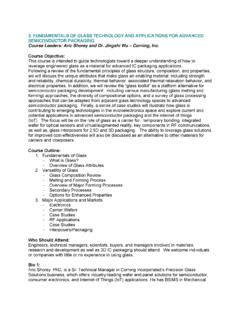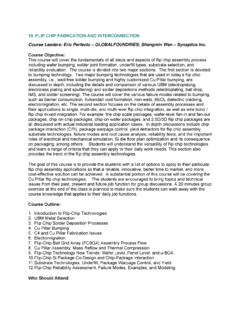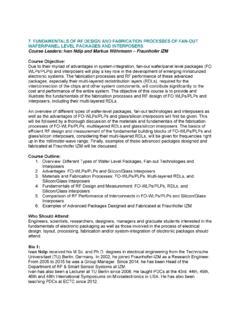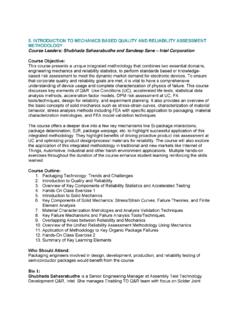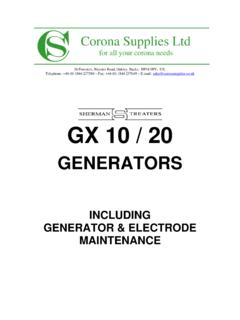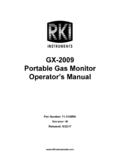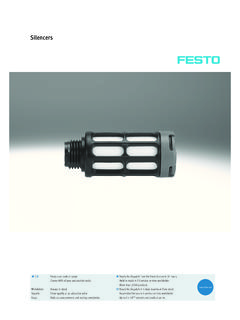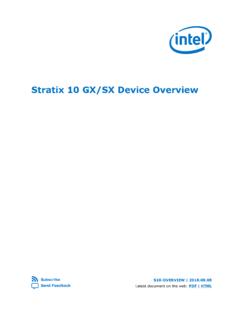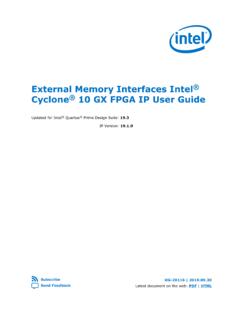Transcription of Low Df Build-up Material for High Frequency Signal ...
1 5/30/2013 1 Low Df Build-up Material for high Frequency Signal Transmission of substrates The 63rd Electronic Components and Technology Conference (ECTC) The Cosmopolitan of Las Vegas, Nevada, USA May 28 - 31, 2013 Hirohisa Narahashi Functional Materials Group Research Institute for Bioscience Products & Fine Chemicals Ajinomoto. Co., Inc. 2 5/30/2013 Today s Presentation company introduction of Ajinomoto Build-up Film (ABF) Df Build-up Material for high speed transmission of PKG , GZ41 and GY11 with very thin Cu transfer film 3 5/30/2013 Ajinomoto Co., Inc. Pharmaceuticals and Health To become a group of health promoting companies with a scientific approach to good taste and health Foods To become a global group of food companies centered on the world s seasoning business Amino science (bioscience & fine chemical products) To become a global company of Amino Science that contributes to humankind with the world s No.
2 1 amino acid technology. Ajinomoto Co., Inc. Bioscience Products & Fine Chemicals Division Functional Materials Group Research Institute for Bioscience Products & Fine Chemicals R&D Location ; Kawasaki-ku. Kawasaki-shi, Kanagawa 5/30/2013 4 Ajinomoto Build-up Film (ABF) 5 5/30/2013 ABF Application ABF Core ABF Pkg Cross-section view IC packages Wiring circuits (Cu patterns) Si Chip PCB Electronic Products 6 5/30/2013 (Varnish Production) (Coating & Slitting) (Product) Outline of ABF production Mixing STAGE 1 STAGE 2 Filler PET Drying QC/QA, Sales & Technical service STAGE 3 7 5/30/2013 ABF / Construction and Type ABF-SH ABF-SH9K 1999 Supporter film (PET 38um) Cover film (OPP 16um) Resin layer (10-100um) ABF-GX3 [X section] ABF : 3-layer construction ABF-GX13 To get high insulation reliability Halogen Free Lower CTE narrower via pitch (Stacked) connection reliability ABF has been improved with the progress of IC.
3 2001 2003 2005- Roadmap of ABF ABF-GX92 2011- 8 5/30/2013 Outline of manufacturing substrate using ABF Repeat for multilayered BU ABF core 3L 2L 1L ABF 3L 2L 1L Semiconductor chip [x-section] [package] of core-boards Cu surface treatment & pre-drying (130-190degC*30min) 2. ABF placement on both side and vacuum lamination & metal hot-press 3. Pre-cure in a hot air clean over, 180degC*30min 4. Via formation by CO2 or UV-YAG laser 5. Desmear & E ls Cu plating and drying (100-150degC*30min) 6. Dry Film lamination 7. Dry Film patterning (exposure and development) 8. Electro Cu plating 9. Removal of Dry Film Pater formation by SAP (Semi-Additive Process) 10. Flash etching & annealing (Full-cure) 9 5/30/2013 Next Build-up Material in demand Demand for Build-up Material Fine line & space ( high adhesion strength with low roughness) Fine via pitch Low warpage during cure and reflow Low CTE, high insulation reliability (Layer to Layer, and circuit to circuit) Current PKG structure Downsizing Use thinner core high function high reliability BGA CSP Coreless package Next Build-up Material in demand 10 5/30/2013 To reduce the transmission Low dielectric loss tangent (Df) Low dielectric constant (Dk) Low smooth surface at the interface between resin and conduct layer Good adhesion strength with smooth surface Thinner layer Transmission loss (a) = Conductor loss(ac) + Dielectric loss(ad) ac x Rs (f)
4 Ad e x f x tand e : Dielectric constant tand : Dielectric loss tangent Rs(f): Conductor surface resistance ( Frequency ) high Frequency Signal high functionalization of high -end equipment high transmission loss Consumption of electronic signals PCB substrate Circuit (Cu) high Frequency Signal Smooth surface high transmission because of low resistance at the interface. Roughened surface Low transmission because of high resistance at the interface of Cu and resin 11 5/30/2013 ABF Type & Resin Chemistry GX series (Epoxy & Phenol Hardener) GZ series (Epoxy & Cyanate ester) GY series (Epoxy & Phenolic Ester Hardener) ROOOHOROH+ OR + R -C=O ROOOHOROH-C-R OR = O CNORNNNRRRONCH2R'OR+ + RO OR OR ROOOHOROH 12 5/30/2013 ABF-GX series: GX-T31 GX series (Epoxy & Phenol Hardener) ROOOHOROH+ OR Lower CTE Higher Young s Modulus Lower Df Lower water absorption Good insulation reliability Test Condition GX13 GX92 GX-T31 CTE x-y (ppm: 25-150degC) by tensile TMA 46 39 23 CTE x-y (ppm.)
5 150-240degC) by tensile TMA 120 117 78 Tg (degC, by tensile TMA) 156 153 154 Tg (degC, DMA) 177 168 172 Young's modulus (GPa) 23 degC Tensile strength (MPa) 23 degC 93 98 104 Elongation (%) 23 degC Dielectric constant (Dk) (Cavity perturbation , ) Dielectric loss constant (Df) (Cavity perturbation, ) Water absorption 100degC,1h (wt%) HAST L/S=15/15um (130degC, 85%, ) 200h< 200h< 200h< GX13 curing, 13 5/30/2013 Smooth Surface for Fine Line Formation GX-T31 GX92 GX13 SEM of Resin Surface after Desmear (x3500) / Cu peel strength The key of fine line formation is to lower profile (smooth surface) with keeping high peel strength. Difficult for fine line formation ABF [X-section image] Cu Fast flash-etching! Good for fine line formation ABF Cu Cu L/S=16/16 um L/S=10/10 um Cu 14 5/30/2013 ABF-GZ series : GZ-41 GZ series (Cyanate ester & Epoxy) CNORNNNRRRONCH2R'OR+ + RO OR OR ROOOHOROH Test Condition GZ22 GZ41 CTE x-y (ppm: 25-150degC) (tensile TMA) 31 20 CTE x-y (ppm: 150-240degC) (tensile TMA) 82 67 Tg (degC, tensile TMA) 165 176 Tg (degC, DMA) 192 198 Young's modulus (GPa) 23 degC Tensile strength (MPa) 23 degC 116 120 Elongation (%) 23 degC Dielectric constant (Dk) (Cavity perturbation , ) Dielectric loss constant (Df) (Cavity perturbation, ) Water absorption 100degC,1h (wt%) HAST L/S=15/15um (130degC, 85%, ) >200h >200h x3500 SEM of Resin Surface after Desmear GZ41: Peel strength 15 5/30/2013 ABF-GY-series: GY11 x3500 GY11.
6 Peel [SEM of Resin Surface after Desmear] OOROR'OLower Polarization Curing GY series (Epoxy & Phenolic Ester Hardener) Test Condition GZ41 GY11 CTE x-y (ppm: 25-150degC) (tensile TMA) 20 26 CTE x-y (ppm: 150-240degC) (tensile TMA) 67 81 Tg (degC, tensile TMA) 176 155 Tg (degC, DMA) 198 165 Young's modulus (GPa) 23 degC Tensile strength (MPa) 23 degC 120 115 Elongation (%) 23 degC Dielectric constant (Dk) (Cavity perturbation , ) Dielectric loss constant (Df) (Cavity perturbation, ) Water absorption 100degC,1h (wt%) HAST L/S=15/15um (130degC, 85%, ) >200h >200h 16 5/30/2013 Temp. dependency on Dk & Df (@10 GHz) of ABF(40um) ABF -10 5 10 25 ( ) 40 60 80 100 GX13 Dk Df GZ41 Dk Df GX92 Dk Df GX-T31 Dk Df GY11 Dk Df 5/30/2013 17 ABF with very thin Cu transfer film (ABF-RCC) high Adhesion without Anchor Effect 18 5/30/2013 Very Thin Cu Transfer Film with ABF Construction PET(38 um) Alkaline-soluble resin Layer (release layer, 1 um) Key point for the uniform Cu transfer Thin Cu ( 2 um)
7 By vacuum evaporation or sputtering PET PET PET Cu Cu Coating & Drying of alkaline-soluble resin Cu Deposit by vacuum evaporation or sputtering Manufacturing schemes of very thin Cu transfer film PET film (38um) PET film (38um) ABF Construction of ABF-RCC Release layer (1 um) Thin Cu: 1 um Lamination of thin Cu transfer film and ABF ABF-GX series PET(38 um) Release PET (38 um) 19 5/30/2013 Process using ABF-RCC PET GX series Lamination ABF-RCC on the core board Vacuum lamination or Vacuum hot press Curing ( & ) Removal of PET Direct Laser drilling *) One side of the core is shown by space restrictions Release layer Thin Cu Core pattern Plugging TH TH 300um Desmear E-less Cu plating Thin Cu prevents desmear solution from roughening the resin surface. Thin Cu prevents desmear solution from roughening the resin surface.
8 No damage of the resin surface by desmear high adhesion to thin Cu without anchor effect Ultimately low roughness and high adhesion Easy fine line formation Patterning (Semi-additive or Fine-subtractive) 20 5/30/2013 ABF GX series for thin Cu transfer film Test Condition GX92 GX-T31 GX-E4 GX-E5 CTE x-y (ppm: 30-80degC) (tensile TMA) 26 13 8 7 CTE x-y (ppm: 25-150degC) (tensile TMA) 39 23 12 10 CTE x-y (ppm: 150-240degC) (tensile TMA) 117 78 34 29 Tg (degC, tensile TMA) 153 154 156 196 Tg (degC, DMA) 168 172 180 212 Young's modulus (GPa) 23 degC 13 Tensile strength (MPa) 23 degC 98 104 98 106 Elongation (%) 23 degC Dielectric constant (Cavity perturbation , ) Loss tangent (Cavity perturbation, ) Water absorption 100degC,1h (wt%) Comment - Low CTE Low CTE Low CTE high Tg GX-E4, E5 Low CTE Low dielectric loss tangent high Tg (E5) 21 5/30/2013 Cu Adhesion of GX-E4, E5 with Thin Cu Transfer Film Properties GX-E4 GX-E5 Peel strength for Seed process (kgf/cm) After Full-cure After HAST 100h Reliability for 10 times reflow tests No blister No blister Pre-cure GX-E4: 100degCx30min + 180degCx30min GX-E5.
9 100degCx30min + 170degCx30min Full-cure: 190degCx60min (Peak temp. 262degC) SEM image of resin surface after Cu etching Test piece X-sectional view GX-E4: Thin Film HAST Reliability (130degC, 85%RH, DC) No desmear damage led good insulation reliability. 22 5/30/2013 Fine Line Formation & Surface Comparison / GX92 Desmear SAP DFR Pitch (L/S) 16(6/10) 12um (5/7) X-section / x1500 Cu L/S (um) Cu height (um) Over view / Thin Cu Process DFR Pitch (L/S) 16(6/10) 12um (5/7) X-section / Cu L/S (um) Cu height (um) Over view / x3500 16(6/10) 12um (5/7) Very flat surface makes easy to make fine L/S! No desmear damage leads the better insulation reliability. 23 Mechanism of high adhesion strength Some specific chemical groups in the resin composition are enriched at the thin Cu side during curing and they bind Cu to produce coordinate bond and covalent bond.
10 Hence, the self-assembly of these chemical bonds on the surface leads the high adhesion strength. high peel strength without an anchor effect! Curing Coordination compounds = aromatic, elements with lone-pair Thin Cu works for self-assembly of specific bonds on the resin surface and as a protective layer against desmear. Cu Cu Cu Cu Cu Cu Cu Cu Cu Cu PET [ normal cure ] Randomly arranged. [ Cure with thin Cu transfer film ] 5/30/2013 24 O1s XPS analysis on resin surface after cure w/ or w/o Cu C-O bond such as ether or ester alcohol on the resin surface cured with thin copper were observed more than that cured without copper. atomic % unit O-Metal C=O etc. C-O Condition Cure with thin copper Cure without thin copper w/ thin copper w/o thin copper Comparison of Oxygen-narrow spectrum by XPS Proportion of each Oxygen-bond 5/30/2013 Summary Build-up Material for high speed transmission PKG Low Df GX-T31, GZ41 and GY11 Smooth interface between Cu and resin and low CTE ABF with thin Cu transfer film, GX-E4, E5 25 5/30/2013 5/30/2013 26 Thank you !

